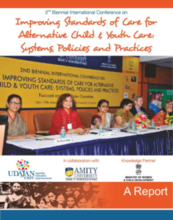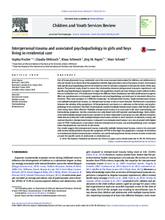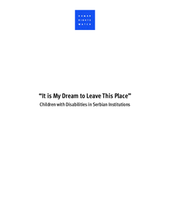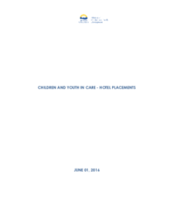Displaying 971 - 980 of 1510
This report contains detailed discussions that occurred during conference sessions. The first day focused on Caregivers. The second day focused on aftercare services. This report contains Article 20 UN Convention on the Rights of the Child. It provides background information on alternative care, which includes a definition and an overview of the alternative care situation in South Asia. It also includes some key guidelines from the UN Guidelines for the Alternative Care for Children.
The present study aimed to assess the relationship between interpersonal traumatic experiences and specific psychopathological symptoms in a high-risk population of girls and boys living in youth welfare institutions in residential care in Switzerland.
The present study aimed to assess the relationship between interpersonal traumatic experiences and specific psychopathological symptoms in a high-risk population of girls and boys living in youth welfare institutions in residential care.
This study examines the effects of early institutional care on infants' brain development.
Using unique 5-year longitudinal data on Korean children in group homes and those under institutional care, this paper compared the medium-term cost-effectiveness of group homes and that of institutional care facilities in terms of developmental outcomes.
This report from Human Rights Watch focuses on the institutionalization of children with disabilities in Serbia.
The role of residential care for children has developed very differently internationally, but in all cultural contexts, there are questions about the extent to which it can help young people recover from high risk backgrounds. In the UK, residential care has come to be seen as the placement of last resort, yet new government guidance on permanence has suggested that residential care can provide security and a sense of belonging.
This special report from the Ministry of Children and Family Development in British Columbia, Canada presents findings on the number of children in care in the province who were sent to stay in hotels.
This guide by the UK's regulatory body, Ofsted, explains in detail what one must do in order to open a residential family centre.
This paper presents selectively on the findings of two separate but related qualitative Irish studies exploring relationship-based approaches in residential child care practice, from the perspectives of both residential child care workers and young care leavers.





